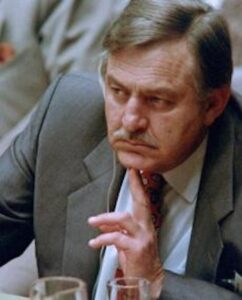
Pik Botha
*Pik Botha was born on this date in 1932. He was a white South African politician who served as the country's foreign minister in the last years of the apartheid era.
Roelof Frederik "Pik" Botha was born at Rustenburg in the Transvaal, to Roelof Frederik Botha and Maria Elizabeth Dreyer. At the age of four, he had meningitis in Maputo, Mozambique, and his mother vowed that if he survived, he would become a church minister. Botha attended Paul Kruger Primary School, where his father was the principal. He excelled in high school in the debating society and the school cadets. Botha was also a writer of both prose and poetry in Afrikaans, which supplemented his salary in his early years as a diplomat. In his first year, he studied law at the University of Pretoria.
Botha began his career in the South African foreign service in 1953. From 1963 to 1966, he served on the team representing South Africa at the International Court of Justice in The Hague. He was appointed legal adviser at the Department of Foreign Affairs, representing South Africa at the United Nations from 1967 to 1977. In 1974, he was appointed South Africa's permanent representative to the United Nations and presented his credentials to the Secretary-General on October 15, 1974; in November of that year, however, South Africa was suspended from membership of the General Assembly, and, over the ensuing years, the country was excluded from official participation in virtually all the UN's organs and agencies.
In 1975, he was appointed South Africa's Ambassador to the United States, in addition to his UN post. In 1977, he re-entered Parliament as MP for Westdene and was appointed Minister for Foreign Affairs. He continued to represent Westdene for the remainder of his political career. Botha was nicknamed 'Pik' (short for pikkewyn, Afrikaans for 'penguin') because of a perceived likeness to a penguin in his stance, accentuated when he wore a suit. Botha entered the contest to be the leader of the National Party in 1978. He allegedly received superior public support among whites but withdrew after criticism concerning his young age, lack of experience (having spent 16 months as foreign minister), and alleged liberal beliefs as opposed to the ultra-conservative NP machinery (in which he lacked a significant position), instead throwing his support behind Peter W. Botha, who was ultimately elected.
The following year, Botha stated publicly that it would be possible for South Africa to be ruled by a Black president if there were guarantees for minority rights. Still, he quickly acknowledged that this position did not reflect government policy. In 1985, Botha helped draft a speech that would have announced everyday decision-making on all levels in a single constitutional unit and a formula for releasing Nelson Mandela. However, P. W. Botha rejected this draft. In early 1986, he was also instrumental in the South African government's negotiations with the Commonwealth Eminent Persons' Group (EPG).
Although the Group's mission was aborted after the South African Military launched cross-border raids on African National Congress bases, in the preceding months, Pik Botha had engaged in extensive talks with the Group about a possible path to negotiations, including calls for a suspension of violence and the unbanning of the ANC. Throughout 1988, Botha was instrumental in lengthy peace talks between South Africa, Cuba, and the People's Republic of Angola to end the South African Border War. On December 22, 1988, Botha signed the Tripartite Accord involving Angola, Cuba, and South Africa in New York City, which led to South Africa's granting of independence to Namibia.
While testifying at the Truth and Reconciliation Commission, Botha was one of the few officials to repent for his involvement in the apartheid government. He said he'd realized that apartheid was morally wrong in the 1970s but didn't do enough to "turn the tide" against the regime and prevent atrocities from being committed, which he blamed on South African security forces. Botha married Helena Bosman in 1953, with whom he had two daughters, Anna Hertzog and the artist Lien Botha, and two sons, the rock musician Piet Botha and the economist Roelof Botha.
Among Botha's eight grandchildren are grandson Arend Botha, theologian and musician, and Roelof Botha. Helena died in 1996 after having been ill, including being partially paralyzed, following a fall in her home in 1991. Two years later, Botha married Ina Joubert, a former journalist with the SABC. Known as a liberal within the party, Botha presented a friendly, conciliatory face to the regime while being internally criticized. He was a leading contender for the leadership of the National Party in 1978 but was ultimately not chosen. Staying in the government after the first non-racial general election in 1994, he served under Mandela as Minister of Mineral and Energy Affairs from 1994 to 1996. Botha died of natural causes at his home on October 12, 2018, at the age of 86.